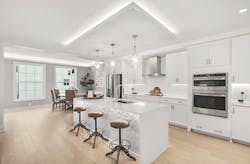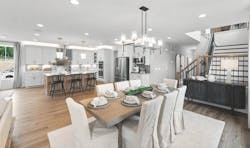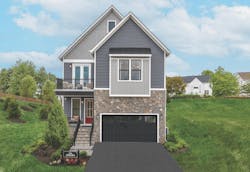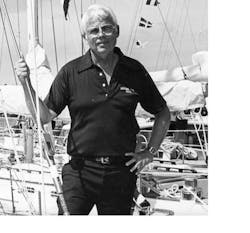Van Metre, Our 2022 Builder of the Year, Is Wired for Change
Walk into Van Metre Homes’ offices in Ashburn, Va., about 35 miles west of Washington, D.C., or its design center, model homes, or 80,000-square-foot component manufacturing facility, and you’ll sense something very different about this builder.
It’s an entrepreneurial spirit, one that is not only palpable, but pervades everything the 67-year-old company does to deliver homes in the highly competitive Northern Virginia market—an estimated 469 closings and roughly $417 million in sales this year, likely making it a Top 75 home builder by revenue in Pro Builder’s Housing Giants rankings.
But that’s not why Van Metre is our 2022 Builder of the Year; in fact, raw numbers were hardly a factor at all. Rather, it was the builder’s long-standing reputation for market-leading product design and quality construction, a truly innovative online and in-person customer experience, a commitment to nurturing and empowering young, diverse talent, a legacy of philanthropy, and an impressive and thoughtful investment in off-site production solutions that elevated them to the top of our list.
None of that happened overnight, of course, and the journey is far from over. “We’re always working on what’s next and where we’re going,” says Rick Rabil, president and CEO of Van Metre Companies, an ethic established by founder Al Van Metre Sr. in 1955 (see “Leader on Land and Sea,” below) that continues today.
Playing Ahead: Van Metre's Move to Modular Construction
Of all its progressive initiatives, arguably the most relevant right now is Van Metre’s move toward modular construction. It’s the next logical step in a methodical production-driven process that started with a wall panel and floor-truss factory that opened in 2005 and has since evolved into a multicomponent off-site operation called Building and Strategic Enterprises (BASE), which supplies at least 40% of every new attached and detached home the company builds.
While the BASE crew works to bring that number up to 50% or more, perhaps adding cabinets, hardware, exterior trim, or drywall to the mix, others on the team are focused on a modular-built future delivered completely in-house, including specialty trades.
“The labor market is going to force the inevitable evolution to modular homes,” says Mike Sandkuhler, VP of building operations. “They’re not making new framers or new drywall guys. There are very few individuals these days who want to take on this line of hard, rigorous work outside in the elements. The future of home building is clearly modular. It’s just a matter of getting it to scale and making it economically feasible.”
To the vast majority of builders still stick-building on site, those hurdles are daunting, at best; even Sandkuhler calls it a big leap. But the so-called “baby steps” Van Metre took with BASE enabled the builder to conceive, design, build, transport, and crane into place a modular townhome called POWERhaus alongside its component-built homes in a real community (see photos, below)—a proof point and learning experience for at least 50 more on the near horizon.
“It’s all about control,” says Sandkuhler—of building schedules, materials, waste and other inefficiencies, and reputational risks that the chronic skilled labor shortage and current supply chain issues bring into sharper focus for home builders almost every day. “We want to figure out the best, most efficient way to build houses and to deliver them on time,” he adds.
In fact, thanks to its BASE operation, Van Metre didn’t miss a closing deadline during the pandemic. “Was it perfect? No,” Sandkuhler admits. “But we did a whole lot better than every other builder in our market,” he adds, referring to framed houses sitting idle for weeks and months awaiting windows, appliances, HVAC equipment, or any number of other parts and pieces that BASE stockpiled even as costs climbed. “We’ve really stayed ahead of the curve.”
Integrated Impacts: Industrializing Housing Production Leads to Company Synergies
Perhaps the most impactful aspect of Van Metre’s drive to industrialize its housing production—besides delivering homes on time and on budget, as promised, to highly satisfied customers—is the synergy and efficiencies it creates across the builder’s design, purchasing, marketing, sales, and warranty service disciplines.
“We’re trying to figure out how to create that holistic homebuying experience,” says Kevin Rabil, EVP of the New Homes Division. It’s an elusive, ever-changing pursuit for those paying attention, and Van Metre studies other industries for their innovations and evolutions to incorporate into its operations. “We’re just wired to think beyond the housing industry and not be confined by others in our circles,” he says.
To wit, Van Metre hired video game designers to develop virtual reality walk-throughs that would improve and differentiate its online homebuying experience. Six years later, that foresight yielded Build Your Own Home (BYOH), an online 3D tool that enables prospects to customize the cabinets, countertops, backsplashes, flooring, and plumbing fixtures of their selected home’s kitchen and baths on a desktop, laptop, tablet, or smartphone (see below). Buyers can save their work and share it with the Van Metre Design Centre, streamlining that process. “We can prepare for an appointment well before a buyer comes in,” says Hayden Browning, senior director of strategic marketing. “It’s taken our Design Centre to another level.”
Soon, the online tool also will help simplify sales contracts. “A buyer will have the option to take the printout to their sales manager and go to contract right away,” says Glenn Forester, VP of marketing. Browning also credits the experience for elevating the builder’s marketing efforts. “Now we can see what people are most interested in,” she says, which informs design and purchasing decisions for future homes.
Just as wall panels and floor trusses served as precursors to Van Metre’s move toward modular construction, BYOH is a prelude to Van Metre Life, an even more immersive experience that will serve as a one-stop repository of information about a buyer’s home and will further streamline communication with customers and employees. “The goal is to bring clarity to all of the chaos that comes with building a home,” Browning says.
Van Metre Company Leadership: Nurturing the Future
Throughout his career at the helm of the company he founded, Al Van Metre Sr. wanted people from outside his family to help lead and run the business. “There have always been non-family members in leadership roles,” says Rick Rabil, who joins an ownership group consisting of Beau Van Metre (Chairman and Corporate Trustee of Van Metre Companies), Alison Van Metre Paley (Director and Corporate Trustee of Van Metre Companies), and Everett Hoeg (Independent Trustee for the Van Metre Family Trust), an independent trustee who meet regularly to give direction and approve the major decisions made by each division.
While bringing in outsiders as owners and leaders is rare for a family-owned building business, the results at Van Metre are undeniable. “We probably have close to 10 people in our company that I think have the potential to run it,” Rabil says. “They’re smarter than me and Beau and so we just watch and let ’em go do it.”
Throughout the broader corporate Van Metre entity, it is common for employees to use some variation of the phrase, “Do what’s right,” a simple admonition that helps guide decisions, with the authority to make those decisions and act on them.
A card given to every employee—from the C-suite to the sales offices and at BASE—outlines what the company describes as “The Van Metre Way,” including its seven pillars: Integrity, Ownership, Respect and Dignity, Teamwork, Work/Life Balance, Community, and Diversity and Inclusion.
Such efforts to remind employees of their purpose and value system may seem a bit heavy-handed, but it works: employees act with dynamism, new ideas are encouraged and supported, and everyone is emboldened to find a work/life balance that translates into an efficient focus while on the job.
And when Rick Rabil refers to nurturing young talent to one day take over the business, it’s not lip service. Since 2016, seven Van Metre employees have been named to Pro Builder’s Forty Under 40 list, which recognizes housing’s next generation of leaders. “We have great leaders and great people under them,” he says. “It’s the best bench we’ve ever had, and that’s what makes us strong.”
Finding and retaining that talent also means looking in new places for people and ensuring the company reflects the population it serves and hopes to attract. Hence, Van Metre formed a Diversity and Inclusion Council two years ago with that directive. “There were already discussions about diversity and inclusion; the council just formalized it,” says Anum Pervaiz, the company’s in-house real estate counsel who leads the effort.
RELATED
- Is Now the Time for Off-Site Construction? [VIDEO]
- Builder of the Year Ivory Homes' Innovation Agenda
- The Pain of Ignoring Change—Consequences for Your Business
Initiatives so far include unconscious bias training, enabling pronoun choices on email signatures, and hosting internal events such as an annual Pride March, a Hispanic heritage art event, and supporting literacy in underserved neighborhoods with Little Free Libraries—some of which were built at BASE. “We want to make it comfortable for people to be authentic, share backgrounds, and feel included,” Pervaiz says.
Similarly, the company’s One Van Metre initiative seeks to corral various aspects of the business to deliver a strong, singular voice to the market. “Amazon does a lot of things, but they market themselves as Amazon,” says Brian Davidson, group president of the New Homes division. “At the end of the day, we’re under one umbrella,” a philosophy that includes efforts to bring as much of the operation as possible in-house instead of farming it out to strangers who may not share the same goals, drive, or that entrepreneurial spirit.
“Ultimately, we have to build that house, and nothing matters until we turn it over to the consumer,” Davidson says. “Anything that gets in the way of that is not helpful.”
Al Van Metre: Leader on Land and Sea
As a renowned yachtsman, Albert G. Van Metre Sr., the founder and namesake of Van Metre Companies, preferred to lead from the start and force the competition to catch up—an approach he used with equal success to gain the upper hand on the home building market in Northern Virginia and forge a legacy that continues today.
The son and grandson of Naval officers, Van Metre grew up loving boats and, while attending the U.S. Naval Academy, was exposed to home building by a fellow student. Al’s aggressive style grew the company into a multibillion-dollar business that enabled him to sail competitively, where he went head-to-head with another billionaire yachtsman, cable TV pioneer Ted Turner—even outbidding his more flamboyant rival for a coveted 61-foot sloop, Running Tide. Al’s son Beau (now chairman of the company) still races it today.
On land, Al Van Metre not only helmed a company that built homes and commercial properties, but also landmark communities ... and a reputation for thinking and playing ahead of others. Whether with his boats or his business, “He loved to experiment and say, ‘Let’s try it!’” says Rick Rabil, president and CEO of Van Metre. “He needed challenges in his life and wanted to challenge us.”
And while he demanded hard work, Al Van Metre also understood the need for work-life balance long before it was fashionable. Rabil recalls logging 80 hours a week in public accounting before joining the company in 1984 and being prepared to do the same at his new job with Van Metre. “Al told me he’d rather have somebody get 80 hours’ worth of work done in 30 hours,” a principle that continues to permeate the company today.
Even Van Metre Homes’ methodical march to component framing and modular-built housing is rooted in the principles of its founder. “It was always one of his goals to have his own production facility,” says Brian Davidson, group president of the New Homes division, a goal realized before Al Van Metre’s death in 2008. “He saw it as a differentiator and a way to gain an advantage.”
Van Metre's Legacy of Giving Back
Charitable giving is a common thread among home builders, from foundations and direct financial support to volunteering at soup kitchens, sponsoring fun runs and cornhole tournaments, and applying trade skills to various building projects for underserved communities.
Like many aspects of the company, Van Metre’s tradition of philanthropy dates back to its founder, Al Van Metre Sr., and a focus on local charities that continues today.
Two foundations, one established by the Van Metre family in 2002, the other by Van Metre Companies in 2014, have collectively donated nearly $8 million to qualified 501(c)(3) charitable organizations. The company also gifted a 5-acre parcel for a palliative care facility (which it continues to support with an annual luncheon), and supports the Children’s National Hospital and Loudoun County (Va.) Schools, including highly successful fun runs for both. Van Metre and its trade partners also give time, resources, and expertise to HomeAid Northern Virginia, an organization that builds and renovates housing and shelters. A more recent initiative donates $1,000 per house for the first 250 homes the builder sells each year to local charities focusing on health care and hunger-relief efforts.
Beyond those direct efforts, Van Metre’s legacy of support has inspired others to follow suit. “We’ve helped some of the small organizations grow to the point where they’re more recognized by others and can really flourish,” says Julie van der Vate, Van Metre’s CFO and group president of finance. “It’s not just writing them a check or coming out to paint or something,” she says. “It’s helping them grow so they can do even more.”
Paul Deffenbaugh, a freelance journalist in the Chicago area, and Denise Dersin, executive editor of Pro Builder Media, contributed to this story.











